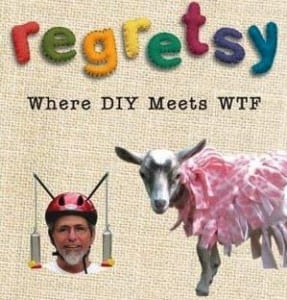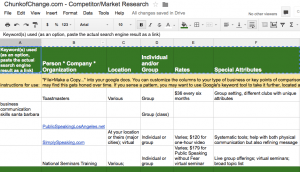 How do I turn my passion into a business? I’ve done vocal coaching for years, mainly as a hobby. Last year I wanted to change into a bona fide business. To that end, I’ve been out there, networking at Chamber events and larger conferences. I’m seeing a need for business folks to gain confidence speaking, live and on camera. I’d like to offer products in that vein, building upon my years of experience as a vocal coach.
How do I turn my passion into a business? I’ve done vocal coaching for years, mainly as a hobby. Last year I wanted to change into a bona fide business. To that end, I’ve been out there, networking at Chamber events and larger conferences. I’m seeing a need for business folks to gain confidence speaking, live and on camera. I’d like to offer products in that vein, building upon my years of experience as a vocal coach.
Sloane Reali
VocalCoachingBySloane.com
Many of my readers have the entrepreneurial spirit and want to be successful business owners. But they haven’t taken the leap quite yet. For most, how to…
…transform their passion into a viable business remains the primary hurdle.
Sloane, in your question you are specifically asking about expanding your talents to a new target market (let’s call them “business professionals”), not just getting more of the same type of clients that want to improve their chances on The Voice.

- The starting point is always getting crystal clear about what you do best (UVP anyone?).
- Then, the sometimes uncomfortable reality check of whether what you are offering is different enough for your target market to pay attention to.
- Speaking of that target market, are there enough of them to fill up your client roster?
Remember To Infuse New Services With Your Proven UVP
You’ve been a voice coach for years, helping singers hone their vocal talents and performance skills.  Upon first speaking with you, I was especially impressed by your ability to take Google’s search results by storm by creating a large video library of quick how to sing tutorials on YouTube. In fact, if someone were to Google “voice coach,” you appear numerous times at the very top of those search results in your area. So, very well done on that front. Your expertise is verified by the Google gods.
Upon first speaking with you, I was especially impressed by your ability to take Google’s search results by storm by creating a large video library of quick how to sing tutorials on YouTube. In fact, if someone were to Google “voice coach,” you appear numerous times at the very top of those search results in your area. So, very well done on that front. Your expertise is verified by the Google gods.
Now, you want to tailor your services to a new audience, in the form of a possible vocal or speaking workshop for business professionals.
Stay true to your unique value proposition (UVP), that “-est” in this new endeavour. Please revisit the components of UVP, and feel free to fill out my UVP worksheet at your leisure! I’ve written about this foundational concept in many different posts, so we’ll be moving on to some other good nuggets.
To isolate your personal UVP, it helps to think back on all the great feedback you’ve gotten over the years as to what value you bring that others cannot, or are not willing to. (Caution: Mild ego boost may result as well.) Be sure to zero in on exactly those qualities when developing your new offering.
If the business demographic is now your muse, how can you frame what you do in their language (what’s in it for me?), while still keeping that core of what makes you passionate? For instance, if clients rave about your fun vocal exercises, can you incorporate them into your business “workshop” to retain the authentic enthusiasm?
We know that you want to bring your awesomeness and rock these business professionals with your fresh approach.
Now, that we’ve clearly answered the why, we can move on to next steps.
Make Sure Reality Checks Don’t Bounce
 One person’s passion may not amount to a viable business (check out the tumblr nostalgia roll celebrating the (sadly) now-defunct Regretsy.com for key examples). So buyers may not always be as enthralled with “that thing you love,” as the Old Spice guy put it. You may still be able to turn your passion into profit, however, if you remain receptive to what the marketplace wants.
One person’s passion may not amount to a viable business (check out the tumblr nostalgia roll celebrating the (sadly) now-defunct Regretsy.com for key examples). So buyers may not always be as enthralled with “that thing you love,” as the Old Spice guy put it. You may still be able to turn your passion into profit, however, if you remain receptive to what the marketplace wants.
And let’s be real: No one has a crystal ball that can predict success and failure in advance. If that were the case, venture capital firms would have better a track record than the 20% win to 80% meh ratio. Also, so-called “failures” sometimes shock the gatekeepers. Look at DoorBot — a doorbell that allows homeowners to see who’s on their doorstep from an app on their cell phones — which sold over 10,000 units in the month after it was rejected on Shark Tank.
While many professionals may benefit greatly by improving their voice quality and communication skills, they may not be willing to pay for those services, for a variety of reasons. So, how can one tell? Well, You have a theory, now time to test it.
How To Conduct Small Business Market Research In One Word: Spreadsheet!
On to brass tacks. What to offer specifically? To Whom specifically? For How Much? How?
 So maybe there isn’t a crystal ball, but there is real life. A product-driven company performs market research before widespread roll-out of a brand new product because they know a good idea is just that until it proves otherwise. So to find out if your idea has legs, time to test the market. Don’t freak — market research is not just something that only huge corporations engage in. In fact, you’ve already started the process without even realizing it, just by discovering all the uncomfortable elevator pitches in your networking group, from whence your idea started to form.
So maybe there isn’t a crystal ball, but there is real life. A product-driven company performs market research before widespread roll-out of a brand new product because they know a good idea is just that until it proves otherwise. So to find out if your idea has legs, time to test the market. Don’t freak — market research is not just something that only huge corporations engage in. In fact, you’ve already started the process without even realizing it, just by discovering all the uncomfortable elevator pitches in your networking group, from whence your idea started to form.
First, consider other similar offerings in your area. This will force you to think of the keywords used by potential customers when looking for the new products you want to offer, and also identify the going price in the marketplace based on what other vendors are actually charging for them. Let’s start to get those insights down on paper so that we can get to the ultimate, “Yes! They don’t just love my idea, they’ll pay for the product it’s based on, too!”
Summarize your research in a good ol’ Google docs or Excel spreadsheet like this one.
Here, I created headings that seemed most relevant for your purposes (though these may be different for other services/industries). This includes the company or organization, where the services are delivered, whether individual or group lessons are offered, and the corresponding rates for those services.

To gather the information, I first did a quick Google search term brainstorm, listing word combos an interested client might employ. (I also recommend asking others to add to your search list; the terms they provide might be surprisingly different from those you’d use to describe yourself.)
My search term list looked something like this:
- business communication skills Santa Barbara
- business coach
- business communication
- professional speech
- vocal training for professionals
Then I began Googling away, visiting the sites that came up, and compiling info until, voila!
Survey Says? Hone Your Services By Homing In On Your Target Market
 So now you have a better idea of what’s already out there and how much people might pay for those services. Time to home in even further on your target market — who are these people and what really stands out to them? Come up with a list of questions that you need answers to. Typically, “qualifying questions” front loaded at the top of your survey will help narrow down your target. (e.g. “Are you a business owner or professional that is interested in…”)
So now you have a better idea of what’s already out there and how much people might pay for those services. Time to home in even further on your target market — who are these people and what really stands out to them? Come up with a list of questions that you need answers to. Typically, “qualifying questions” front loaded at the top of your survey will help narrow down your target. (e.g. “Are you a business owner or professional that is interested in…”)
- Use your current fans as trusted folks you can pose your first set of questions to. Then, if you’re feeling like getting an A from the teacher, take it to the next step, take that survey into your actual marketplace.
- Where might your target market hang out? What if you found out when your local Toastmasters is meeting next, or contacted the teacher of that local class on public speaking?
- Do you feel comfortable cold-calling just a few local business owners to assess their needs? That’s another way to get answers.
- Finally, consider the smarty-pants and pretty scientific Google Consumer Surveys, which lets you poll your audience by geography, age, interest or type of buyer for as little as 10 cents a response. This way, you can poll business folk on whether they would really pay for the service you’re planning to offer.
Observe, then serve.
Or be doomed to boogie the night away in that awesome disco macramé.
Have a question for Ask Olga?
I’d love to hear it.


